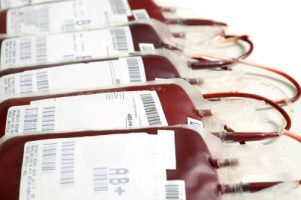- Home
- Editorial
- News
- Practice Guidelines
- Anesthesiology Guidelines
- Cancer Guidelines
- Cardiac Sciences Guidelines
- Critical Care Guidelines
- Dentistry Guidelines
- Dermatology Guidelines
- Diabetes and Endo Guidelines
- Diagnostics Guidelines
- ENT Guidelines
- Featured Practice Guidelines
- Gastroenterology Guidelines
- Geriatrics Guidelines
- Medicine Guidelines
- Nephrology Guidelines
- Neurosciences Guidelines
- Obs and Gynae Guidelines
- Ophthalmology Guidelines
- Orthopaedics Guidelines
- Paediatrics Guidelines
- Psychiatry Guidelines
- Pulmonology Guidelines
- Radiology Guidelines
- Surgery Guidelines
- Urology Guidelines
Blood transfusion during oncosurgery increases cancer recurrence risk

A new study published in the Indian Journal of Anaesthesia has pointed out that patients undergoing perioperative allogeneic blood transfusion during oncosergery are at higher risk of cancer recurrence. The study was conducted by the scientists of Regional Cancer Centre, Trivandrum.
Allogeneic, or homologous, blood transfusions involve collecting and infusing the blood of a compatible donor into the recipient. Allogeneic Blood Transfusion (ABT) has repeatedly been associated with poor prognosis in patients with cancer patients. Immunomodulatory consequences of allogeneic blood transfusion may outweigh the advantages of improved oxygen delivery and tissue perfusion, especially in patients with cancer. In colorectal cancer, there is evidence of cancer relapse in patients who received a transfusion.
The investigators have conducted a retrospective analysis which was undertaken to evaluate the relationship between perioperative blood transfusion and cancer recurrence in patients undergoing oncosurgery.
In this case-control study, the authors have retrospectively analysed the case sheets of 194 patients who had perioperative transfusion and underwent cancer surgery from March to December 2013(Study group, Cases). They were compared with controls matched for cancer site and TNM staging who did not receive perioperative transfusions (Control Group, Controls). The authors intended to find out if the study group had an increased risk of cancer relapse compared with the controls. Records from the institute cancer registry were analysed in 2018 to give a follow-up period of 5 years. Continuous variables were analysed using Student's T test and Mann Whitney U test for normally distributed and skewed data respectively. For Categorical data Fisher's exact test and Chi square test were applied. The risk for recurrence was estimated using odds ratio.
The recurrence rate in cases and controls was 53.09% and 19.59% respectively and the odds ratio, 4.647. In Cases, significant relapse was noted for carcinomas of ovary, colorectal, bladder, larynx, head of pancreas and liver.
The authors concluded that in surgical oncology patients, ABT is associated with a higher risk of cancer relapse.
To more about this article please click on the link below

Disclaimer: This site is primarily intended for healthcare professionals. Any content/information on this website does not replace the advice of medical and/or health professionals and should not be construed as medical/diagnostic advice/endorsement or prescription. Use of this site is subject to our terms of use, privacy policy, advertisement policy. © 2020 Minerva Medical Treatment Pvt Ltd